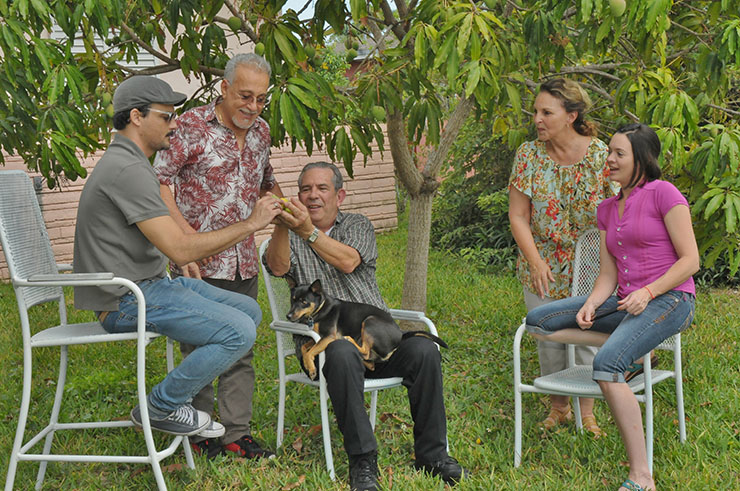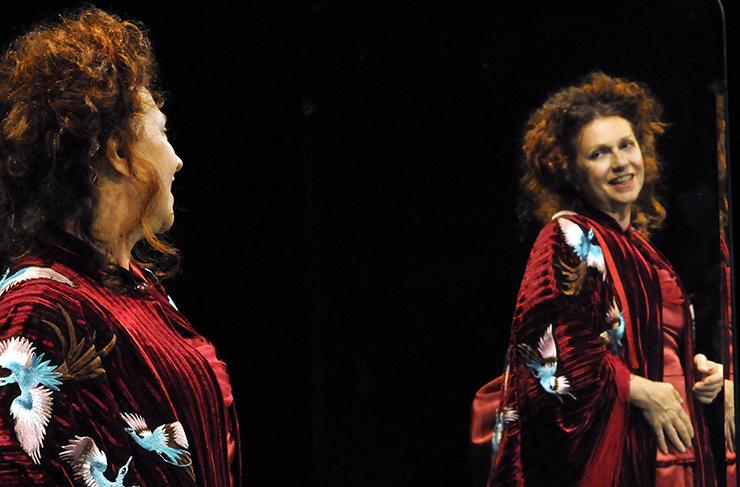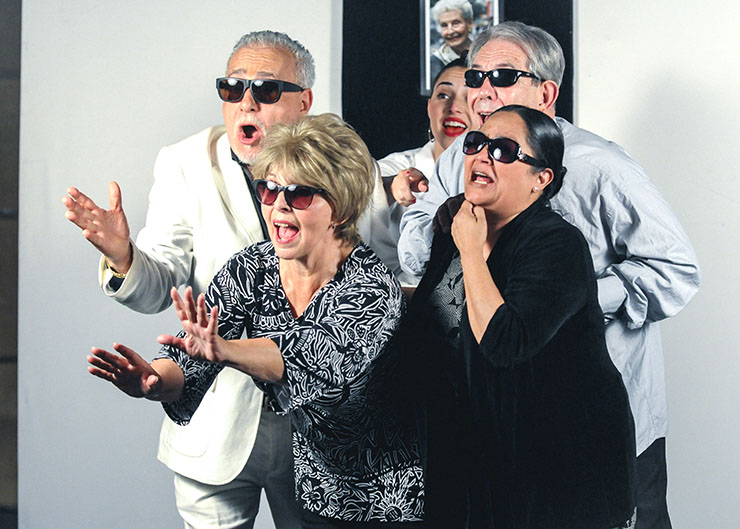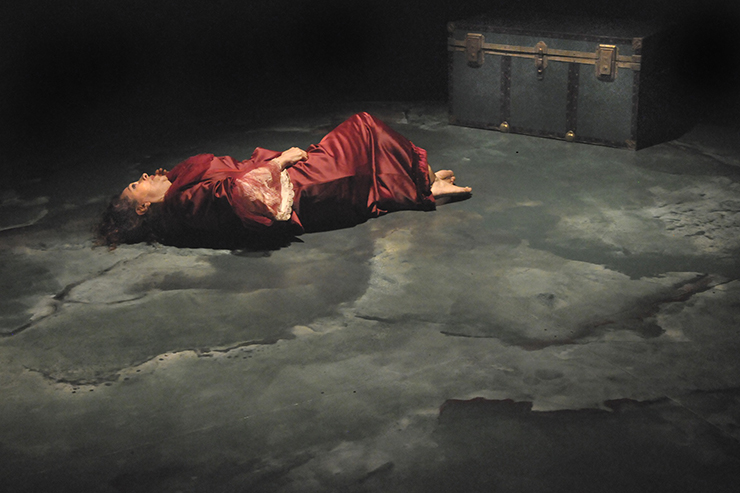For the next three weeks, Miami will be the center of the Hispanic theater community, as companies from six countries continue a tradition that was born here more than three decades ago.

Photo by Asela Torres
The 33rd season of the International Hispanic Theatre Festival of Miami opens Thursday, July 12, and, for the rest of the month, will showcase productions from six countries -- Argentina, Mexico, Puerto Rico, Spain, Uruguay, as well as the United States.
The performances will be held in various venues throughout greater Miami. They will all be in Spanish, except for one, which will have English supertitles.
On opening night, Puerto Rican playwright and director Rosa Luisa Márquez will also receive the festival’s Lifetime Achievement Award for her dedication to the performing arts.
The festival was founded in 1986 to preserve the Hispanic culture through theater and educational programming, says Mario Ernesto Sanchez, the event’s founder and director.
“Our mission is to present theater written by Hispanic playwrights, or those of Hispanic descent. We also present adaptations of classics made by Hispanics,” added Sanchez, who also runs Teatro Avante, a Miami-based theater company.

Photo by Amilcar Persichetti
For his dedication, Sanchez has won awards from the Florida Theatre Conference, Latin American Center for Creation and Research in Theatre, and the Arts and Business Council of Miami, along with others, have honored his dedication to preserving Hispanic culture.
But, from the start, Sanchez had to overcome an interesting challenge –how to put on a festival in Spanish, while the county forbade the spending of public money on printed materials that were in any language other than English.
This was because, when Sanchez founded the festival, Miami-Dade County’s English-Only ordinance was in effect.
Six years earlier, the county commissioners had enacted the law in response to the influx of 125,000 Cuban immigrants that had been brought to the city’s shore by the Mariel boatlift.
The controversial ordinance, which was passed in 1980, forbade the commission from spending any public money to do business in any language other than English. This posed a significant stumbling block to the fledgling organization, recalls Sanchez.
“The ordinance prohibited the county not only from utilizing any language other than English and promoting any culture other than that of the United States. We had received a grant from the State of Florida, so we spent the funds in ads in English for a festival that would be in Spanish,” Sanchez recalls.

Photo by Asela Torres
The ordinance was eventually softened, and finally repealed in 1993. But, by then, the festival had become first a national event, and then an international one, thanks to grants from the Ford Foundation and the Rockefeller foundation, he recalls.
Today, the festival attracts some 5,000 to 7,500 people a year, who come for the plays, which cover all genres, with no particular theme in mind, he says.
“We present all kinds of plays from different countries, trying to satisfy Miami’s diversity,” says Sanchez.
The plays selected have either been seen by Sanchez at international film festivals, or the videos viewed by his three-member panel.
“We not only look for artistic quality but for size of company, technical difficulties, their touring experience, message of play, reviews, etc. Some countries support cultural and artistic endeavors extremely well and companies tour a lot, others not so much. But we try to invite groups, if they have a good production, from any country in Latin America and Spain,” he says.
Right from the start, the festival never shied away from political controversy, he notes.

Photo by Amilcar Persichetti
“On our first opening night, there was a very nasty political controversy over one of the playwrights, and a couple of actors interrupted my technical rehearsal to inform me I had to cancel because this was a ‘communist festival,’” Sanchez recalls. “I asked them where the demonstration would take place, so that I could wash the sidewalk for them, and the rest is history.”
This year’s lineup of plays includes:
- July 12-15: Hij@s de la Bernarda (Daughters of Bernarda), Puerto Rico, Carnival Studio Theater, Adrienne Arsht Center
- July 13-15: La Ultima Felicidad (The Ultimate Happiness), USA, Miami-Dade County Auditorium lobby, free admission and parking
- July 14-15: #malitos16 (#damned 16), Spain, Miami-Dade County Auditorium’s On.Stage Black Box Theater
- July 18-19: Eramos Cuatro (We were Four), Miami, USA, Adriana Barraza Black Box (This play continues July 25-Aug. 8)
- July 19-21: Unos Two (Two), Argentina, Miami-Dade County Auditorium’s On.Stage Black Box Theatre
- July 20-21: La Incapaz (Incapable), Carnival Studio Theatre, Adrienne Arsht Center
- July 21: El Gato y la Gaviota (The Cat and the Seagull) - International Children’s Day, Key Biscayne Community Center
- July 22: El Gato y la Gaviota (The Cat and the Seagull) - Miami-Dade County Auditorium’s On.Stage Black Box Theatre
- July 26-28: En Nigun Lugar Del Mundo (Nowhere in the World), Miami, USA, (English supertitles), Carnival Studio Theater, Adrienne Arsht Center
- July 27-28: Wenses & Lala (Wenses and Lala) Mexico, Miami-Dade County Auditorium’s On.Stage Black Box Theatre
The 33rd International Hispanic Theatre Festival of Miami runs from July 12-29. Tickets range from $28-$34, and performances will be held in these venues:
Adrienne Arsht Center’s Carnival Theater, 1300 Biscayne Blvd, Miami, www.arshtcenter.org
Miami-Dade County Auditorium’s On.Stage Black Box Theatre, 2901 W Flagler St, Miami, www.miamidadecountyauditorium.org
Key Biscayne Community Center, 10 Village Green Way, Key Biscayne
Adriana Barraza Black Box, 3100 NW 72nd Ave #127, Miami, FL 33122, www.abactingstudio.com
For tickets and information: www.teatroavante.org or call 305-445-8877.
 MAIN MENU
MAIN MENU

